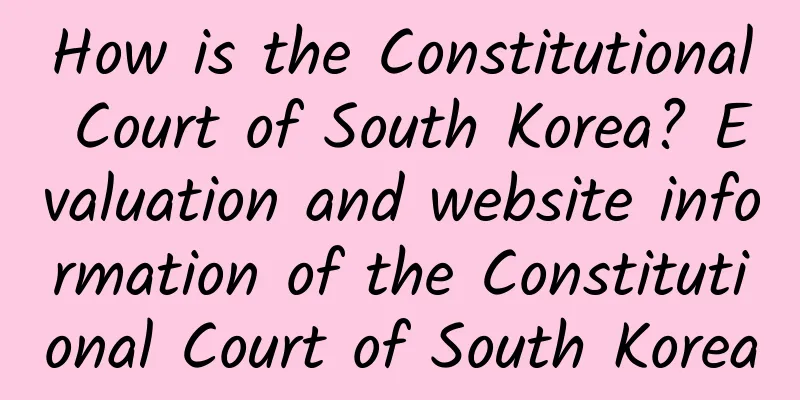How is the Constitutional Court of South Korea? Evaluation and website information of the Constitutional Court of South Korea

|
What is the Constitutional Court of Korea? The Constitutional Court of Korea is an independent judicial institution in South Korea. It was established in 1988. Its main function is to conduct unconstitutional review based on the Constitution of the Republic of Korea. It can exercise judicial power over impeachment, dissolution of political parties, and disputes over the authority of state organs. Website: www.ccourt.go.kr South Korea's Constitutional Court: An independent judicial institution that upholds constitutional orderThe Constitutional Court of Korea (Korean name: 헌법재판소, English name: Constitutional Court of Korea) is an important independent judicial institution in South Korea. It was established in 1988 to maintain the country's rule of law and constitutional order in accordance with the Constitution of the Republic of Korea. As a core component of South Korea's constitutional system, the Constitutional Court plays a key role in handling major issues such as unconstitutional review, impeachment, dissolution of political parties, and disputes over the authority of state organs. Official website: www.ccourt.go.kr 1. Historical Background of the Korean Constitutional CourtThe establishment of the Constitutional Court of South Korea stems from the need for democratization and the rule of law. In the 1980s, as the Korean society's call for a democratic system grew louder and louder, it became particularly important to establish an institution specifically responsible for constitutional interpretation and unconstitutional review. The democratization movement in June 1987 promoted major changes in South Korea's political system. The Constitution of the Republic of Korea, revised in the same year, clearly stipulated the establishment of a Constitutional Court and gave it a wide range of powers. On September 5, 1988, the Constitutional Court of South Korea was formally established, marking a new stage in the constitutional system of South Korea. Since then, the Constitutional Court has become an important institution for protecting the basic rights of citizens and supervising the operation of government power. In its nearly 40 years of development, the Constitutional Court has continuously consolidated and deepened the constitutional foundation of South Korea through a series of landmark rulings. II. Main Functions of the Constitutional Court of KoreaAs the core institution in the Korean constitutional system, the Constitutional Court undertakes a number of important functions, mainly including the following aspects:
These functions together constitute the core mission of the Constitutional Court, which is to ensure that the exercise of state power is in line with the spirit of the Constitution and to protect the basic rights of citizens through independent and impartial judicial review. 3. Organizational Structure of the Constitutional Court of South KoreaIn order to ensure its independence and authority, the Constitutional Court of South Korea adopts a unique organizational structure. The Constitutional Court is composed of nine justices, three of whom are appointed by the president, three are elected by the National Assembly, and the other three are nominated by the Chief Justice of the Supreme Court. This diversified appointment mechanism is intended to balance the interests of different power organs and ensure the neutrality and impartiality of the Constitutional Court. The term of office of the Chief Justice of the Constitutional Court is six years and he cannot be re-elected. This provision is intended to prevent the solidification of power and ensure that the Constitutional Court can always maintain its vitality and independence. In addition, the Constitutional Court also has a number of auxiliary departments, including the Secretariat, Research Office and Library, to provide the Chief Justice with necessary administrative and technical support. IV. Trial Procedure of the Constitutional Court of South KoreaThe Constitutional Court's trial procedures are rigorous and standardized, and are mainly divided into the following stages:
The entire trial process emphasizes the unity of procedural justice and substantive justice, and strives to ensure that every case is handled fairly through scientific and reasonable procedural design. 5. Representative Cases of the Constitutional Court of South KoreaSince its establishment, the Constitutional Court of South Korea has established its important position in the constitutional system through a series of landmark cases. The following are several representative cases:
These cases not only demonstrate the Constitutional Court's ability to deal with major political and social issues, but also accumulate rich practical experience for it and establish its core position in the constitutional system. VI. The Impact and Significance of the Korean Constitutional CourtAs an important pillar of South Korea's constitutional system, the Constitutional Court has played an irreplaceable role in maintaining the rule of law, protecting citizens' rights and supervising the exercise of power. First, through independent and fair judicial review, the Constitutional Court has effectively curbed the abuse of power and promoted the standardization and legalization of national governance. Secondly, the Constitutional Court provides citizens with a channel to seek constitutional protection, so that basic rights no longer remain on paper, but become truly enforceable legal guarantees. Through the constitutional appeal system, ordinary people can directly file lawsuits with the Constitutional Court, greatly enhancing the actual effectiveness of the Constitution. Finally, the professionalism and authority demonstrated by the Constitutional Court in handling major political disputes have made important contributions to the stability and development of Korean society. Whether it is the impeachment of the president or the dissolution of political parties, the Constitutional Court has won wide respect from all walks of life with its rigorous attitude and fair rulings. VII. Future Prospects for the Constitutional Court of KoreaWith the acceleration of globalization and the rapid development of information technology, the Constitutional Court of Korea is facing new opportunities and challenges. On the one hand, the complexity of modern society requires the Constitutional Court to continuously improve its professional level to deal with new legal issues and international affairs; on the other hand, the public's demand for judicial transparency and participation is constantly increasing, and the Constitutional Court needs to further improve its working mechanism and strengthen communication and interaction with all sectors of society. Looking ahead, the Constitutional Court of Korea will continue to uphold the principles of independence and impartiality, actively adapt to the changes of the times, and continue to move forward on the path of maintaining constitutional order and protecting citizens' rights. At the same time, the Constitutional Court will also be committed to promoting the exchange and development of regional and even global constitutional culture, and contribute to building a more harmonious and just international community. In short, the Constitutional Court of Korea is not only the core pillar of the Korean constitutional system, but also a shining pearl in the global constitutional practice. Its existence and development have provided valuable experience and inspiration for the construction of the rule of law in Korea and even the world. |
<<: How is Hamburg Airport in Germany? Reviews and website information of Hamburg Airport in Germany
Recommend
How is Kangwon University in South Korea? Reviews and website information of Kangwon University in South Korea
What is the website of Kangwon University in South...
How many ways can you eat tomatoes? Common ways to eat tomatoes
There are many ways to eat tomatoes, and each tas...
Nutritional value of Arctic shrimp and how to cook Arctic shrimp
Nutritional value of Arctic shrimp Arctic shrimp ...
Nutrition of tomato sauce
Everyone knows the nutritional value of tomatoes....
The efficacy, effects and contraindications of purple radish peel
Everyone may have eaten purple radish. It is a co...
The efficacy of oyster and hair algae porridge
The effects of oyster and hair algae porridge can...
How to eat water chestnuts best? What to eat with water chestnuts best
Water chestnut is a unique food in China. It is s...
The dangers of junk food Side effects of eating junk food
The so-called junk food is food that has no nutri...
What porridge can nourish the stomach in summer? What porridge can nourish the stomach in summer?
Summer is the season with the highest temperature...
What is Bank of Portugal like? Bank of Portugal reviews and website information
What is the website of Bank of Portugal? The Bank ...
What is the Baltimore Sun like? Baltimore Sun reviews and website information
What is the Baltimore Sun website? The Baltimore S...
The efficacy of anchovy porridge
How much do you know about the effects and functi...
Sea cucumber and black plum porridge
Sea cucumber and black plum porridge is a porridg...
Should you add sugar to scrambled eggs with tomatoes?
Should you add sugar to scrambled eggs with tomat...
Nutritional value and efficacy of Cuiguan pear
Have you ever eaten Cuiguan Pear? It is a hybrid ...









